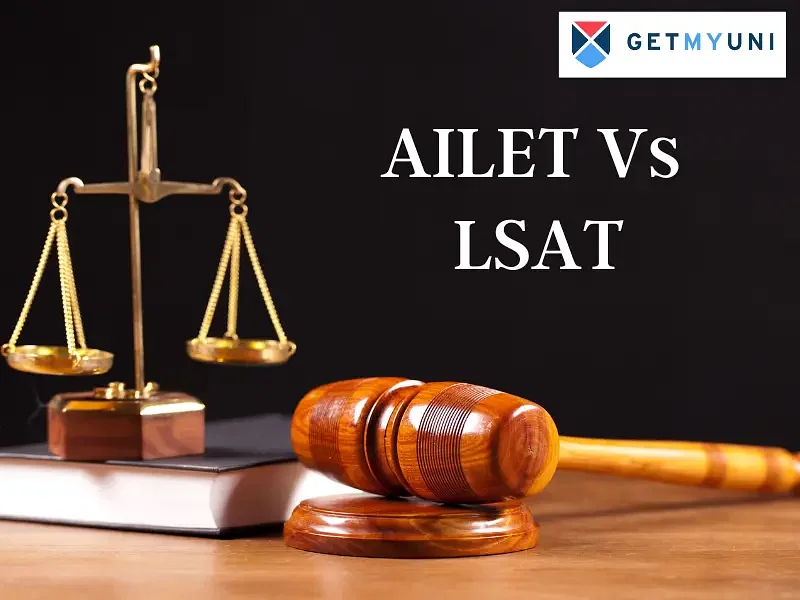Understand the key differences between LLB and BA LLB programs, including course duration, eligibility criteria, syllabus, career opportunities, and more, to make an informed decision about your legal education.
Difference Between LLB and BA LLB: Choosing the right legal education path is crucial for aspiring law professionals. Thus, knowing the difference between LLB and BA LLB is important. LLB and the BA LLB are two different programs that aim to address different levels of learning and professional development.
LLB is a three-year course for graduates who wish to focus on law while the BA LLB is a five-year program in which arts and law are studied concurrently from semester one. This article compares and contrasts these two degrees, their eligibility criteria, course content, duration, career prospects, and how to make a choice between the two.
Knowing these differences will help you decide which program is suitable for your career goals and educational background.
LLB: Overview
LLB stands for Bachelor of Laws, often known as Legum Baccalaureus. It is an undergraduate course that gives students a full understanding of the legal system, including all of its guiding principles, concepts, practical applications, and procedures. The LLB course lasts three years.
Overall, the job prospects for LLB graduates are promising. Because of the extensive curriculum, law graduates have numerous job options in law companies, including positions such as legal advisor, advocate, solicitor, legal analyst, public prosecutor, and legal journalist. The annual LLB salary ranges between INR 2 and 8 LPA.
Also Read: B.Sc LLB Vs BA LLB - Which Is Better?
BA LLB: Overview
Bachelor of Arts and Bachelor of Legislative Law (BA LLB) is a five-year undergraduate integrated program. Candidates who have completed their 10+2 can take this course. Students wishing to study BA LLB at the undergraduate level must take tests such as CLAT, LSAT, or AILET. They must also have completed their 10+2 with a minimum aggregate of 50 to 55%.
The course seeks to provide students with a thorough understanding of Arts and Social Sciences, as well as legal education. It enables students to establish a solid basis in fields such as history, sociology, criminology, family law, administrative law, and others. Furthermore, applicants can choose some specialist courses within BA LLB in the later stages of their studies.
Also Read: LLB vs LLM - Which one to Choose?
LLB and BA LLB: Key Differences
Candidates can check the key differences between LLB and BA LLB in the table given below.
|
Key Differentiators |
LLB |
BA LLB |
|
Objective |
Provides in-depth knowledge of law |
Offers a broad understanding of both Arts and Law subjects |
|
Course Duration |
3 Years |
5 Years |
|
Curriculum Focus |
Purely focused on legal studies and law subjects |
Combination of Arts subjects (e.g., Political Science, Sociology) and Law |
|
Eligibility |
Graduation in any discipline |
10+2 or equivalent |
|
Entrance Exam |
CLAT, LSAT, SLAT, AILET |
CLAT, SLAT, CUCET, SUAT |
|
Specializations Offered |
Constitutional Law, Labour Law, Family Law, Intellectual Property Law, Taxation Law, Corporate Law and Governance, Property Law, Banking Law, Company Law |
Constitutional Law, Criminal Law, Corporate Law, Family Law, International Law, Environmental Law, Human Rights Law, Tax Law, Civil Law, Cyber Law |
|
Ideal For |
Individuals seeking to specialize in law after graduation |
Students who want to start their legal education right after school |
|
Career Opportunities |
Legal Manager, Attorney, Lawyer, General Counsel, Legal Advisor, HR Manager |
Legal Advisor, Lawyer, Paralegal, Junior Lawyer |
|
Average Salary |
INR 2 LPA - INR 8 LPA |
INR 2 LPA - INR 5 LPA |
|
Top Recruiters |
AZB & Partners, Trilegal, J Sagar Associates, Khaitan & Co, etc. |
Amarchand Mangaldas, Luthra & Luthra Law Offices, ICICI Bank, Reliance Industries, etc. |
.Also Read: BA LLB vs BBA LLB - Which Is Better?
Difference Between LLB and BA LLB: Eligibility Criteria
The eligibility criteria for LLB and BA LLB differ significantly. To pursue BA LLB, students must just complete their class 12 in any relevant stream. For admission to an LLB programme, a student needs to finish their graduation in any applicable stream.
LLB Eligibility
The aspirants must meet the following eligibility criteria for LLB admission-
- Students interested in pursuing a Bachelor of Legislative Law should achieve a minimum of 45% in Class XII and pass the entrance exam.
- To pursue an LLB, candidates must have finished their degree with a minimum of 45% aggregate marks or equivalent CGPA from a recognized college.
- If you have already graduated (from any stream or course), you can simply pursue LLB for three years by passing the required entry tests.
- There is no higher age limit for studying a Bachelor of Legislative Law in India.
BA LLB Eligibility
The eligibility criteria for BA LLB include elements such as maximum age, admission exam cut-off, HSC percentage, and so on. The eligibility criteria for BA LLB in India are stated below-
- The candidate must have passed 10+2 examinations in commerce, arts, or any other subject with a minimum of 50-55% marks for the general category and 45% marks for reserved students.
- According to college requirements, students must also pass CLAT, SLAT, and other entry exams.
- Some institutions have no age restrictions; however, the majority have a general category age limit of 20 years and a reserved category age limit of 22 years.
Also Read: LLB Vs MBA - Which is Better?
Difference Between LLB and BA LLB: Syllabus
The curriculum for LLB and BA LLB is quite distinct. While the LLB curriculum focuses solely on legal concepts, the BA LLB program incorporates humanities concepts as well. The key curriculum areas of a three-year LLB include criminal law, family law, international law, cyber law, corporate law, and others. On the other hand, BA LLB main curriculum themes include history, sociology, administrative law, criminology, family law, corporate law, human rights, and other legal subjects.
LLB Syllabus
The LLB course is designed to help students develop and apply their legal skills. This discipline of law entails studying, developing, and applying legal abilities. Some of the subjects included in the LLB course syllabus are listed below:
|
Semester 1 |
Semester 2 |
|
Labor Law |
Family Laws II |
|
Family Law I |
Law of Tort & Consumer Protection Act |
|
Crime |
Constitutional Law |
|
Women & Law |
Professional Ethics |
|
Semester 3 |
Semester 4 |
|
Law of Evidence |
Jurisprudence |
|
Human Rights & International Law |
Practical Training - Legal Aid |
|
Environmental Law |
Property Law including the transfer of Property Act |
|
Arbitration, Conciliation & Alternative |
International Economics Law |
|
Semester 5 |
Semester 6 |
|
Civil Procedure Code (CPC) |
Code of Criminal Procedure |
|
Interpretation of Statutes |
Company Law |
|
Legal Writing |
Practical Training - Moot Court |
|
Land Laws including ceiling and other local laws |
Practical Training II - Drafting |
|
Administrative Law |
Criminology |
Also More: LLB Career Scope
BA LLB Syllabus
The BA LLB curriculum includes disciplines including economics, sociology, English, legal procedure, contract law, business law, family law, constitutional law, and criminal law. The BA LLB syllabus is provided below, semester by semester:
|
First Semester |
Second Semester |
|
English Paper I: Law and Language |
Political Science III: (Public Policy & Administration in India) |
|
Political Science I: (Political Theory) |
Law of Society |
|
Introduction to Sociology |
Constitutional Law I |
|
Economics I: (Principles of Economics) |
Law of Crimes Paper II (CrPC) |
|
Law of Tort |
Public International Law |
|
Law of Contract |
Interdisciplinary Project |
|
Third Semester |
Fourth Semester |
|
Political Science V (International Organizations) |
Foreign Language – French |
|
Family Law I |
Administrative Law |
|
Jurisprudence |
Labour and Industrial Laws I |
|
Law of Evidence |
Alternate Dispute Resolution |
|
Company Law I |
Honours 1 of 1 |
|
Interdisciplinary Project |
Honours 2 of 1 |
|
Fifth Semester |
Sixth Semester |
|
Moot Court Exercise & Internship |
English Language II: LP C Skills |
|
Drafting: Pleading & Conveyance |
Political Science II: (History of Indian Political System) |
|
Conflict of Laws |
Psychology of Life |
|
Consumer and Competition Law |
Economics II (Business Economics) |
|
Honours 1 of 1 |
Law of Crimes Paper I (Penal Code) |
|
Honours 2 of 1 |
- |
|
Seventh Semester |
Eighth Semester |
|
Political Science IV: International Relations |
Political Science VI: (Feminism and Indian Politics) |
|
Economics III: Public Economics |
Company Law II |
|
Constitutional Law II |
Family Law II |
|
Environmental Law |
Civil Procedure Code and Limitation Act |
|
Property Law |
Intellectual Property Rights |
|
Ninth Semester |
Tenth Semester |
|
Labour and Industrial Law II |
Principles of Taxation Laws |
|
Cyber Law |
Professional Ethics & Professional Accounting System |
|
Interpretation of Statutes |
Seminar Course |
|
Honours 3 of 1 |
Honours 3 of 2 |
|
Honours 4 of 1 |
Honours 4 of 2 |
Also Read: BA LLB Key Syllabus & Subjects
Top Colleges for LLB and BA LLB
India offers several famous law colleges and institutions that provide LLB and BA LLB programs. These have been listed in the tables as follows.
LLB Colleges
Candidates can find the list of top colleges for pursuing LLB in the table below.
|
Name of the Institute |
Tuition Fee Per Year |
Admission Fees |
Miscellaneous Fees Per Year |
|
INR 3 lakh |
INR 20,000 |
INR 1.51 lakh |
|
|
INR 44,000 |
INR 4,500 |
INR 26,000 |
|
|
INR 51,160 |
- |
INR 18,500 |
|
|
INR 13,500 |
INR 2100 |
INR 5,000 |
|
|
INR 2.44 lakh |
INR 11,000 |
INR 1.02 lakh |
|
|
INR 1.42 lakh |
INR 10,000 |
INR 2.23 lakh |
|
|
INR 15,000 |
INR 550 |
INR 10,340 |
|
|
INR 2.40 lakh |
INR 5,000 |
- |
|
|
INR 2,200 |
INR 100 |
INR 8,000 |
|
|
INR 1.04 lakh |
- |
INR 80,500 |
|
|
INR 1 lakh |
INR 15,000 |
INR 60,000 |
|
|
INR 42,000 |
INR 5,000 |
INR 40,135 |
|
|
The University of Burdwan |
INR 1,200 |
INR 200 |
INR 5,130 |
|
INR 1.2 lakh |
INR 1,500 |
INR 6,000 |
Also Read: LLB After BSc 2024: Eligibility, Fees, Top Colleges, Career Scope
BA LLB Colleges
Candidates can find the list of top colleges for pursuing BA LLB in the table below.
|
Name of the College |
Annual Tuition Fees |
Admission Fees |
Miscellaneous Fees Per Year |
|
INR 2.69 lakh |
INR 12,000 |
INR 45,000 |
|
|
INR 2.44 lakh |
INR 11,000 |
INR 41,000 |
|
|
INR 1.55 lakh |
INR 5000 |
INR 10,000 |
|
|
INR 3.55 lakh |
INR 10,000 |
INR 3 lakh |
|
|
INR 4.53 lakh |
- |
INR 20,000 |
|
|
INR 1.2 lakh |
INR 2000 |
INR 42,000 |
|
|
INR 3.75 lakh |
- |
INR 1.25 lakh |
|
|
INR 1 lakh |
- |
INR 50,000 |
|
|
INR 2.25 lakh |
- |
- |
|
|
INR 3.40 akh |
INR 75,000 |
- |
|
|
INR 3,402 |
- |
INR 325 |
Also Read: Fee Structure of Top BA LLB Colleges in India
LLB and BA LLB: Which One to Choose?
Deciding between an LLB and a BA LLB depends on your level of studies and what you want to achieve in your future.
The LLB is a 3-year course and the program is suitable for students who already possess a bachelor’s degree in any course. Rather, it is solely dedicated to legal education, which makes it suitable for individuals who are sure they want to practice law upon graduation. Compared to the LLB, this option is more specialized and takes a shorter time to complete, making it easier for students to begin their legal careers.
On the other hand, the BA LLB is a 5-year course that integrates arts and law subjects. It is ideal for students who have already done their 12th standard and are clear about their choice of law from the start. The BA LLB gives a more generalized learning that includes legal and humanities topics, which can be advantageous if the candidate wants to practice law in fields related to social sciences.
As far as job prospects are concerned, both degrees enable one to practice as a lawyer but the BA LLB program is more versatile due to the fact that it embraces different disciplines. However, if you wish to pursue a specialized legal education after passing the degree, then the LLB is the option for you. If you wish to have a broader base with law as the major discipline, then BA LLB might be more suitable for you.
Also Read: Courses and Career options after LLB










